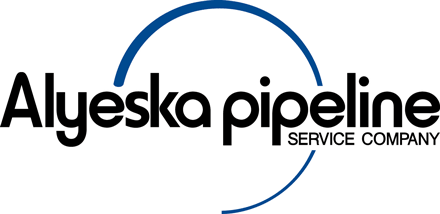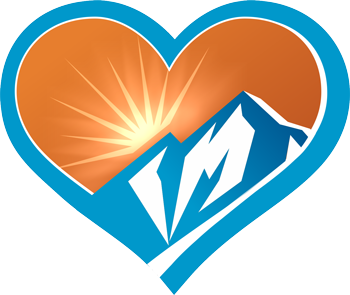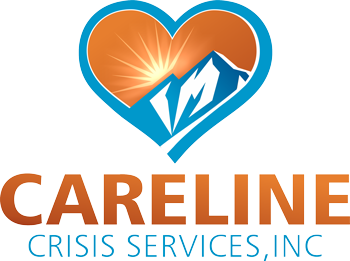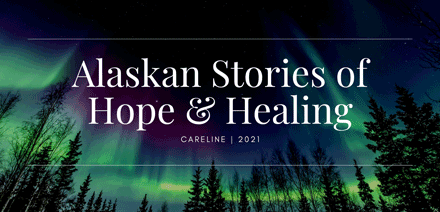
Teisha Simmons is a Koyukon Athabascan whose family comes from the communities of Galena, Huslia and Koyukuk, along the Yukon and Koyukuk Rivers. She lives in Fairbanks where her and her partner Zac are raising their 16-year-old daughter Tassy. Teisha was injured in a car accident in 1992 that left her paralyzed from the chest down. Since then, she has overcome depression and anxiety and gone on to achieve a Masters degree, built a successful career and is passionate about volunteering in the community.
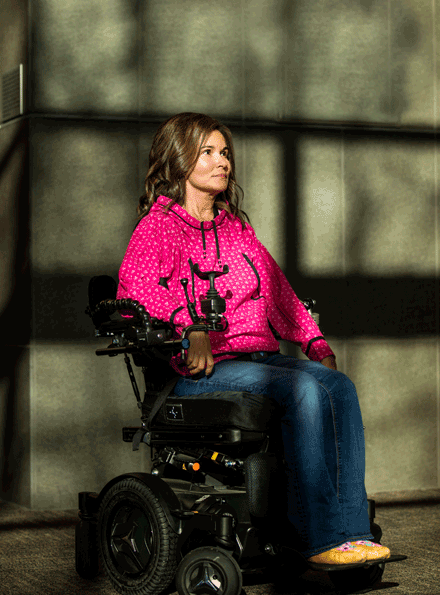
At Careline, we want Alaskans to know that we are not only a suicide prevention hotline, that we are a someone-to-talk-to hotline as well. We want Alaskans to reach out to us to talk whenever they need help or someone to talk to. There are many barriers to reaching out, including many internal barriers. What would you say to someone who needs help and someone to talk to but may not like the idea of reaching out to ask for help?
It’s natural to need help when we are struggling. It’s a part of the human experience. Never be ashamed or afraid to ask for help. Asking for help is a sign of strength, courage and self-love. I have always been a fan of the Careline and of counseling because they give us an opportunity to talk to someone who is confidential, nonjudgmental and a good listener.
It’s natural to need help when we are struggling. It’s a part of the human experience. Never be ashamed or afraid to ask for help. Asking for help is a sign of strength, courage and self-love.
T. Simmons
Alaska can be a challenging place to live. What are some things you do to cope and thrive in our unique Alaskan environment?
I surround myself with positive people, volunteer, practice my language and traditional songs, experiment with new recipes, go to church and allow myself to ask for help when I need it. I’m always trying something new, because that’s how we learn what we enjoy doing. Whenever I am feeling down, I always message a couple of trusted friends and tell them to check in with me in a couple of days to see how I’m doing. I’ve gotten to know myself really well. If I’m emotionally struggling or feeling down for more than 2 weeks, I know it’s time to make an appointment with my provider.
Whenever I am feeling down, I always message a couple of trusted friends and tell them to check in with me in a couple of days to see how I’m doing. I’ve gotten to know myself really well. If I’m emotionally struggling or feeling down for more than 2 weeks, I know it’s time to make an appointment with my provider.
T. Simmons
During a time of great uncertainty and turmoil and transition, what gives you hope right now? And what makes you proud?
Knowing that I have made it through difficult times in the past, and knowing that my parents, my grandparents and my ancestors all survived difficult times in the past gives me hope. We have so many examples of people and generations that have made it through very difficult circumstances and experiences. I’m proud that I reached out for help during this past year when I needed it, that I allowed myself to cry when I needed to, that I was easy on myself on the difficult days and that I took the opportunity to learn new things and skills that I wouldn’t have otherwise.
During difficult times, is there a mantra or some sort of touchstone that you return to? Something that gives you strength or offers perspective during challenging times?
I remind myself that 28 years ago, I woke up paralyzed in the ICU, and that if I can make it through that, I can make it through anything. How I experience a situation is up to me. I can choose to experience it by completely falling apart and letting my life become chaotic, or I can allow myself to feel the feelings and work through them in a healthy way. I also often remind myself that healing doesn’t always feel good. Surgery and recovery from a broken bone will not feel good, but the healing is happening. It’s the same way when we are emotionally hurting, sometimes it can be a painful process to heal and work through those feelings, but it doesn’t mean that the healing isn’t happening.
Looking back on times of acute stress and crisis in your life, what advice would you give yourself?
Keep going. Even if things look hopeless now, you can still create and have a beautiful story. This is just one chapter of your life, not the entire book.
Feeling joyful can seem complicated after times of crisis. What are some ways that you have let joy back into your life?
I don’t remember a time when I had a hard time experiencing joy after a crisis.
In crisis or simply need someone to talk to?
Call anytime, toll-free:
1-877-266-4357 (HELP)
or text 4help to 839863
3-11 p.m. Tuesday-Saturday
Thank you Alyeska Pipeline Service Company for sponsoring Alaskan Stories of Hope & Healing
